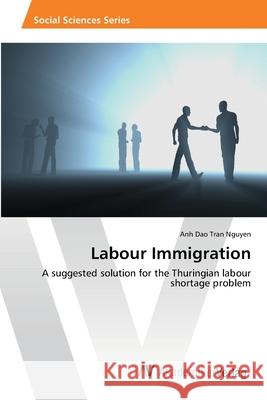Labour Immigration » książka
Labour Immigration
ISBN-13: 9783639464368 / Angielski / Miękka / 2013 / 72 str.
The financial crisis in 2008 has gone but its affection still left the EU a disaster behind for example: Greece with highest record government debt, Spain and Portugal with the alarm rate of unemployment and Italy with a red inflation. The German economy is however a good exception. Its industrialization has well developed and brought a positive GDP and a number of job to the labour market. This number of job has grown rapidly that created its own excess labour demand situation. It is now addressed as an serious issue, which will escalate in the next decade. Germany needs urgent additional manpower. Labour immigration is one of their best option. But lets not the immigration history repeating, like the Turkish labour immigrants in the BDR 1960s incidence or the mistreated Vietnamese guest workers in the GDR 1980s. A well-organized integration plan is also what it needs. Therefore I suggest the suitable approaches from the macro and micro aspects such as: combine the international economic relations (labour as main factor) with regional economic long term development (effective productivity as main purpose). Managing the cross culture issue is also very important: respecting each nation and recognizing each identity. The main purpose of this book is to prove that the labour immigration is the right solution for Germany and the right approaches.
The financial crisis in 2008 has gone but its affection still left the EU a disaster behind for example: Greece with highest record government debt, Spain and Portugal with the alarm rate of unemployment and Italy with a red inflation. The German economy is however a good exception. Its industrialization has well developed and brought a positive GDP and a number of job to the labour market. This number of job has grown rapidly that created its own excess labour demand situation. It is now addressed as an serious issue, which will escalate in the next decade. Germany needs urgent additional manpower. Labour immigration is one of their best option. But lets not the immigration history repeating, like the Turkish labour immigrants in the BDR 1960s incidence or the mistreated Vietnamese guest workers in the GDR 1980s. A well-organized integration plan is also what it needs. Therefore I suggest the suitable approaches from the macro and micro aspects such as: combine the international economic relations (labour as main factor) with regional economic long term development (effective productivity as main purpose). Managing the cross culture issue is also very important: respecting each nation and recognizing each identity. The main purpose of this book is to prove that the labour immigration is the right solution for Germany and the right approaches.











